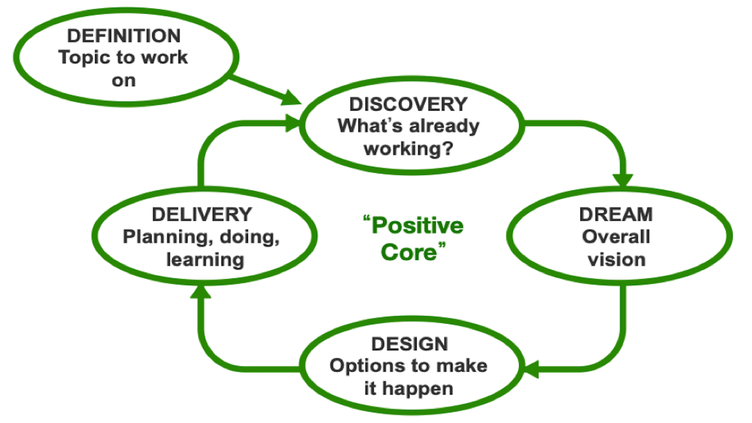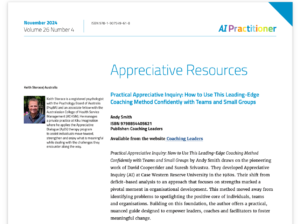How to Use Appreciative Inquiry in One-to-One Coaching: the Discovery Stage

[ad_1]

What the Discovery Stage Is For
Just as in Appreciative Inquiry at the organisational or team level, the Discovery stage of the 5-D format in one-to-one coaching serves three functions:
- To find the aspects of the coaching client’s performance that are already working well (to make the approach work, we assume that there are some). Once these are identified, it becomes easier for the client to become aware of the factors that contribute to better performance – some or all of which may be within the client’s control. If they can put those factors in place more widely, performance can improve.
- To build or restore the client’s confidence. If their confidence has been knocked (e.g. by some unwelcome feedback, or by performing below their own standards for whatever reason), this can impact on their performance. Research shows that when we feel positive, we are more resilient, more creative, more able to see the big picture, and we make better decisions.
- To form a stronger and more deeply rooted basis for setting goals and envisioning the future. It is easier to base your vision of the future on past reference experiences of success, rather than being faced with a blank sheet of paper and trying to come up with something from scratch.
Tools For The Discovery Stage: Appreciative Interviews
In Appreciative Inquiry we are not interested in benchmarking average performance. Rather, we look for examples of success, even if these are once-in-a-blue-moon exceptions. Ideally, we’re looking for peak experiences, because these are where the client is going to learn most about the conditions that enable success and what to do to bring it about.
To keep us safe, the human brain has evolved to pay more attention to threats and mistakes than opportunities and successes. This has the unfortunate result that when faced with challenges, we can lose confidence because we forget about our past successes and occasions that demonstrate that we do have certain skills and qualities. Sometimes we need a reminder of these memories, so that we can start to recover our sense of self-efficacy.
Here’s a suggested format for appreciative interviews, which will help your client remember their strengths, reconnect with their values, and identify conditions they can put in place to help them perform better in future.
1. Tell me about one of your best experiences <in relation to the topic> – a time when you felt most alive, most engaged, and proud of yourself and your work?
In the Definition stage we helped the client ‘flip’ their conception of the problem into an ‘affirmative topic’ – a positively-worded statement of where they want to get to, rather than what they want to get away from. Now, in the Discovery stage, we can ask them to tell us about one of their best experiences related to that topic – in effect, a time when they were experiencing the opposite of the current problem.
We’re looking for a story here, rather than a detached analysis of the experience or a bullet-point summary. If the whole interview is over in a few sentences, you haven’t gone into sufficient depth; you can ask for more detail on anything you hear that you think is likely to illuminate strengths or highlight resources that the client can use in their current situation.
You’ll know that the appreciative interview is going well because you’ll see the client start to relive their good experience, losing themselves in the memory and feeling some of the same positive emotions that they felt at the time. You’ll know when you’re doing a really good interview when you as the interviewer start to feel some of the same positive emotions, because the rapport between you is so strong. Recounting stories of good experiences activate the ‘Default Mode’ or ’empathic’ network in the client’s brain, taking them out of stressed ‘Task Positive‘ or analytic thinking and helping them to be more creative and more open to new ideas.
The more the client talks about their good experience, the more they will associate into it, which makes it easier for them to recall more details what they saw, what they heard, what they were telling themselves at the time, and what they felt about it. Any of these details may help spark ideas, remind them of strategies they have previously used to solve problems or achieve goals, or just fuel their motivation.
2. What’s really important about this experience? What do you value most about it?
This question will elicit some, at least, of the client’s values – the factors that motivate them, and that form their criteria for deciding whether something is right. For the coach, it’s very useful to gain an idea of what will motivate your client – especially when it comes to goal-setting later on in the coaching process. For the coachee, it’s also helpful, as there’s some research evidence to suggest that reconnecting with your deepest values makes you more resilient.
3. What made this experience possible? What conditions were in place that enabled it to happen?
This question helps the client get clearer about the circumstances in which they work best, what tools or support will be helpful, and how to do things in the way that suits them.
4. If you had one wish for yourself in relation to <the chosen topic>, what would that be?
This question is a bridge to the next stage of the process (the Dream stage) in which they envision what success would look like. It’s also an opportunity to start comparing where they are with where they want to be, in a way that focuses on the positive differences, rather than what’s wrong with the current situation.
Next week: More tools for the Discovery stage: how to use scaling questions
[ad_2]




